How to make the most of your time
A few years ago about a year into my full-time role as CEO of my company, I realized that my time management was beginning to get out of my control.
As part of a growing company within a larger public company, we had meetings, upon meetings — and it didn’t seem like there was an easy way to work around some of our growing pains. Everyone was bogged, and as CEO, it was my job to clear a path for everyone else.
But before I could right the ship for our entire company, I needed to focus on my personal time.
One cannot even think of managing one’s time unless one first knows where it goes.
Peter Drucker – The Effective Executive
It felt like my time was being squandered some days and even though I worked very hard to ensured that I had balance in my life, working only 40 hours a week or less, the stress was starting to pile up…
Time is the scarcest resource
If you want to be effective, at whatever you do, you need to be properly managing your time.
Time is the scarcest resource, and unless it is managed, nothing else can be managed.
Peter Drucker – The Effective Executive
I don’t think I need to bother to convince you further of the importance of time.
We all know it is important.
Yet, we still all manage to waste a heck of a lot of it.
Time Management 101
So I turned to the one place that I like to go when times get tough; Amazon. It was time to re-create my own “Time Management 101” refresher course:
- I purchased a copy of The Effective Executive: The Definitive Guide to Getting the Right Things Done, by Peter F. Drucker.
- I found my copy of The 4-Hour Workweek by Tim Ferriss
- I downloaded an eBook version of The ONE Thing: The Surprisingly Simple Truth Behind Extraordinary Results by Gary Keller with Jay Papasan
After reading and digesting my material, what I already knew had become even more clear:
- I needed to track my time to know where it was going, and make appropriate adjustments
- I needed to optimize my time to lean into the 20% of my work that would create 80% of my results
- I needed to focus my time by scheduling in-depth time blocks for deep thinking and doing the work that would make me more effective
What is a time log?
I have learned over the years that while you can rely on your gut for many decisions, you also have to listen to the data. I may think that I am working on the right things at the right time, but is it true?
There is only one way to find out that is to track your time:
Effective executives, in my observation, do not start with their tasks. They start with their time. And they do not start out with planning. They start by finding out where their time actually goes. Then they attempt to manage their time and to cut back unproductive demands on their time.
Peter Drucker – The Effective Executive
Drucker encourages rigorous and real-time logging of time. In order to properly do this, I turned to a spreadsheet.
My goal was to log every minute of every work day, even the commute.
Accidentally Retired
Yes, even my commute! The reasoning was because I either listened to a relevant podcast or took phone calls with my business partner and/or employees or clients. It was a work!
The Time Tracking Spreadsheet: your time log
To make the most of my spreadsheet, I tracked the Date, Start Time, End Time, Total Time Spent (auto-calculated), Task Description, Category, and a Sub-Category. Here is what the data entry looks like:

Once I had enough data, I created queries to sum up the time spent each day, week, month on each category. Then the results were spit out into a nice to look at visual chart that really helped me to get a feel for how I was spending my time:
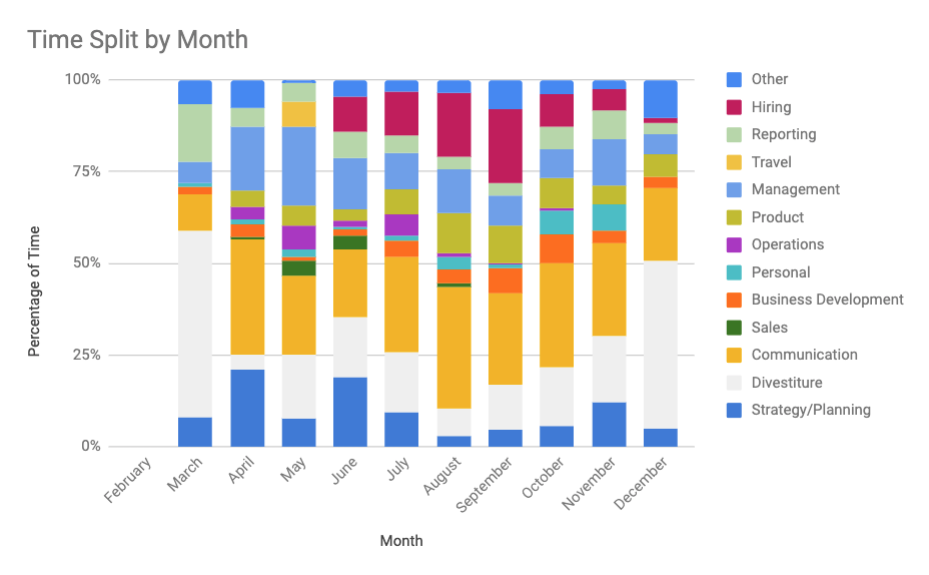
The great part about tracking my time, was that I finally began to have some real-life data to go along with my assumptions. And, over time you begin to see patterns emerge.
Tracking every minute of every day allows you to observe your actions, and make changes on the fly. This helped me to ensure that I focused my time on the most effective things for not only myself, but my entire organization.
Pruning the time wasters
Tracking your time will naturally allow you to see where you may be sinking more time into an unproductive task, or vice-versa where you are not sinking your time into.
Still tracking your time alone does not make you more effective at your job. If you are focused on the wrong things, then it makes no matter.
1. Doing something unimportant well does not make it important.
2. Requiring a lot of time does not make a task important.
Tim Ferriss – The 4-Hour Workweek
To truly hone in on what is important, embracing the 80/20 principle or Pareto’s Law is paramount. Tim Ferriss gives a good summary:
“Pareto’s Law can be summarized as follows: 80% of the outputs result from 20% of the inputs. Alternative ways to phrase this include:
- 80% of the consequences flow from 20% of the causes
- 80% of the results come from 20% of the effort and time
- 80% of company profits come from 20% of the products and customers
- 80% of all stock market gains are realized by 20% of the investors and 20% of an individual portfolio”
So your task is to really think about where your 80/20’s are in your job and in your life.
In Gary Keller’s The ONE Thing, he boils the 80/20 principle down to one simple statement that IMO helps us to really think through where to focus our time most effectively:
What’s the ONE Thing I can do / such that by doing it / everything else will be easier or unnecessary?
Gary Keller, The One Thing
This is 80/20 thinking at it’s best. What can I do right now, such that by doing it, it makes everything else easier or unnecessary.
Focusing on the RIGHT things; The ONE Thing Example
Let’s walk through a quick example.
I recognized that a big problem we were having in the organization was that we weren’t always hiring the right person for the right job. Most of our hires seemed like good hires, but there was more employee churn than I would have liked, and it was taking its toll on the business. We were treading water.
So I thought to myself, as a CEO, if I am looking to improve talent across the organization, “what exactly can I do to get the most out of my efforts? I am only one person after all.”
My answer was to create a system for my employees to teach them how to properly vet and hire employees. If every hiring manager was trained in the same system and rigorous hiring process, the results should be that we begin to make better hires across the entire organization.
Once I boiled down that this was the ONE thing that I needed to be working on to make our hiring efforts better and therefore improve work output for the entire company, I focused on putting a majority of my efforts there.
You can see my time shift into building out our hiring system in this chart:
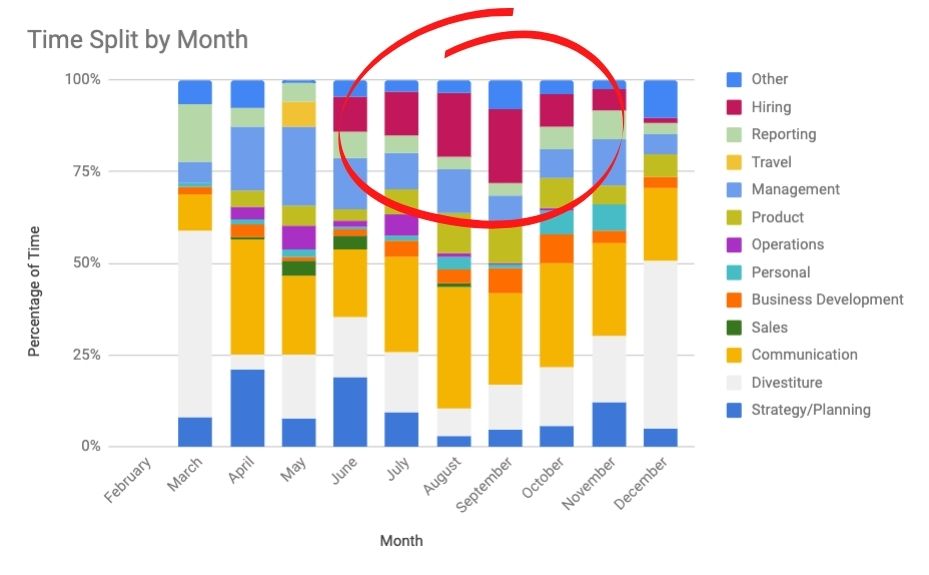
The end results, were that by the end of my four month focus, we were making better, stronger hires, and we had a consistent process and system throughout the organization to ensure a good cultural fit and a better fit for each role.
Schedule in-depth time blocks
When you are an individual contributor, you have these blocks of time built into your day for you. But as you hire more employees or move up within an organization, your schedule at some point is no longer yours.
As a rule, meetings should never be allowed to become the main demand on an executive’s time. “
Peter Drucker – The Effective Executive
The best way to take back your time (after you have started tracking) will be to be relentless with opting out of unnecessary meetings and things that are simply unproductive.
The second, equally important task, is to schedule thinking and working time blocks into your daily schedule.
Only YOU can determine what that looks like, but for me, it was:
- Not scheduling any meetings on Fridays
- Keeping my afternoons after 3pm clear.
It takes a few weeks, but once people know that you aren’t taking meetings after 3pm or on Fridays, they’ll find a way to work around it.
Or they may walk with you to their car on your way out of the office, and instead of having a meeting that took 30 mins, you just solved a problem in 5.
Effectiveness starts with time
You don’t have to log time to be an effective boss, employee, or person.
But tracking time, will open your eyes to what you are really spending your time on.
From this moment forward, remember this: What you do is infinitely more important than how you do it.
Tim Ferriss – The 4-Hour Workweek
Similar to how tracking my happiness has helped to make me happier, tracking my time made me a more effective executive.
Track your time with The Time Tracking Spreadsheet
To get a copy of The Time Tracking Spreadsheet, please click the button below -> this will prompt you to “make a copy” of the Google Sheet to your drive.
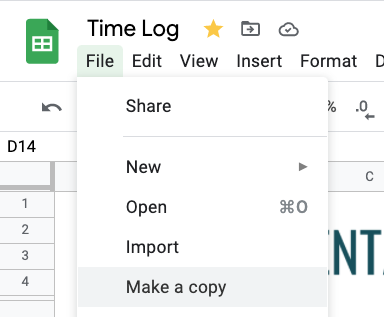
From there, you will want to navigate to the “Time Log” tab and you can see an example of two months worth of my recorded time:

You will want to clear that out and start over.
Note: Task Categories need to match exactly the Category on the “Time Log”, or the queries will not work.
Finally, you will want to navigate to the “Monthly Summary” tab and enter in your own matching “Task Category” to the ones that you will enter on the “Time Log” tab. The queries in the month columns will automatically begin to summarize your time as you track it.
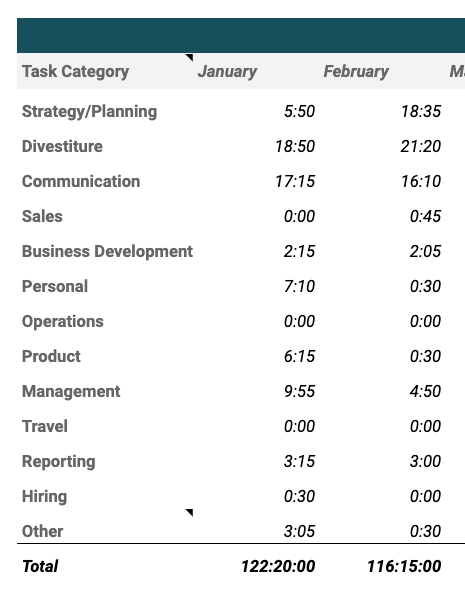
After that, you will be up and running.
Also as an additional bonus, I have included a tab for “Wins of the Week” – sometimes it feels like you are treading water, and this is a great way to remind yourself that you are getting sh$t done every week:

If you have any questions or run into any issues, please let me know in the comments! Happy time tracking.
Additional ways to track time: Time Tracking Software
I haven’t used any of these software tools recently, as I prefer a good old spreadsheet, but if you are interested in software to track your time, here are some tools that look promising:
- Clockify – claims to be “The most popular free time tracker for teams”
- Toggl Track – “The world’s best time tracking software for individuals and businesses”
- HourStack – “Effectively plan, track, and prioritize your time. All in one visual calendar.”
- Everhour – “Powerful time tracking software with hassle-free integrations”
- Harvest – “Harvest is modern time tracking software – for less effort, more joy, and improved profitability.”
- RescueTime – “Understand your time in a way you never have before”

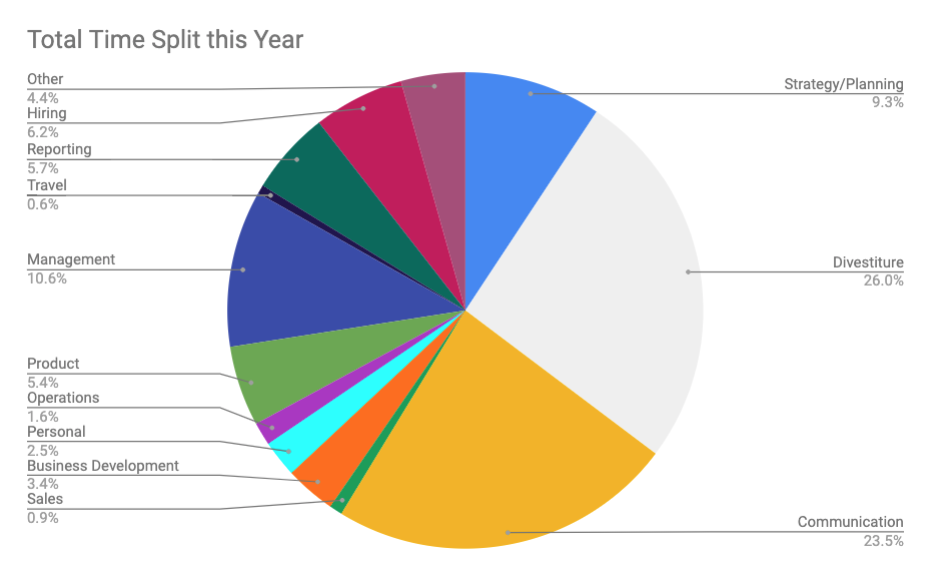
Hi! Great tips you have here. I’m having issues with the spreadsheet automatically updating once I start to enter in the time log. Any tips?
Thanks!
Natasha – I’ll email you separately to troubleshoot!
What a good resource! Time management has been the most important thing for me, as I have returned to teaching full time this year. Where I work, we are trained in the 7 Habits of Highly Effective People, and we are encouraged to stay focused on things that are important but not urgent. Learning to prioritize and let people know that I will get to their issue later, has been a challenge, but it has made my time much more productive.
Thanks! I imagine that it must be very hard to manage your time when you are teaching, because so much of your day is tied down in the classroom. What type of urgent issues do you typically end up facing in your job?